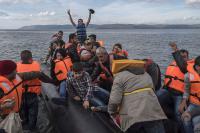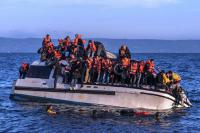-
FARC’s development of narco-submarines
The Revolutionary Armed Forces of Colombia (FARC) and the Colombian government are in the final stages of negotiating an end to the leftist insurgency in Colombia, but over the last forty years, FARC has proven to be one of the most formidable non-state actors in the world. Showing sophistication and adaptability, the group has upgraded its former methods of drug transportation in favor of a more covert alternative. The development of semi-submersible vessels by FARC highlights the group’s capabilities to engage in highly complex engineering tasks, facilitating drug trafficking across the South and Central American coasts.
-
-
Arab youths reject ISIS, say effort to establish Islamic State will fail

Arab youth say the rise of ISIS remains the single biggest challenge facing the Middle East, but young people in the region overwhelmingly reject the extremist group and believe it will fail to establish an Islamic state. That is the headline finding of the eighth annual ASDA’A Burson-Marsteller Arab Youth Survey, released the other day. ASDA says that while three in four Arab youth are concerned about the rise of ISIS, just one in six believes the terrorist group ultimately will succeed.
-
-
10-fold increase in number of children Boko Haram uses in suicide attacks
The number of children involved in ‘suicide’ attacks in Nigeria, Cameroon, Chad, and Niger has risen sharply over the past year, from four in 2014 to forty-four in 2015, according to a UNICEF report released yesterday. More than 75 percent of the children involved in the attacks are girls.
-
-
Privacy advocacy groups ask NSA to halt changes to data sharing rules
More than thirty organizations sent a letter to the Director of National Intelligence and the Director of the National Security Agency, urging them to halt reported changes to the rules governing when and how the NSA can share the data it collects through overseas surveillance.
-
-
Boko Haram willing to release kidnapped girls for $56 million ransom
Boko Haram has said it was demanding a ransom of nearly $56 million for the release of the 219 schoolgirls it kidnapped from the Nigerian town of Chibok two years ago. The Islamist militants conveyed their demand in secret contacts with the government of President Muhammadu Buhari, who, during last year’s presidential campaign, said that if need be, he would negotiate with the militants for the girls’ release.
-
-
Overwhelming majority of British Muslims reject suicide bombers, terrorism: Survey

An in-depth survey found that 96 percent of British Muslims do not sympathize with radical Muslims who take part in suicide bomb attacks. The vast majority of those surveyed show similar levels of support to the wider British public in support for British institutions and a feeling of belonging to Britain. On some social and cultural issues, however, a large number of British Muslims are out of step with the wider population.
-
-
Four questions Belgians should ask about the Patriot Act

The Paris and Brussels terrorist attacks added a sense of urgency to calls for Belgium to enact its own counterterrorism bill. It is a call the French government has already answered. Increased use of surveillance is a worldwide trend. There is no guarantee, however, that even with the most sophisticated surveillance technology out there today, passing a bill or law to collect private information on citizens will protect us from terrorist threats and violence. Even more vexing: the nature of intelligence gathering means we may never know exactly how many attacks have been prevented by the Patriot Act, the French surveillance law — or a similar law that Belgium may soon pass.
-
-
New urgency in preparing for solar storm Big One

The specter of a geomagnetic solar storm with the ferocity to disrupt communications satellites, knock out GPS systems, shut down air travel and quench lights, computers and telephones in millions of homes for days, months, or even years has yet to grip the public as a panic-inducing possibility. But it is a scenario that space scientists, global insurance corporations and government agencies from the Department of Homeland Security (DHS) to NASA to the White House Office of Science and Technology Policy (OSTP) take seriously, calling it a “low probability but high-impact event” that merits a substantial push on several fronts: research, forecasting, and mitigation strategy.
-
-
U.S. more likely to use force in a military dispute when the president is a Southerner
The United States is more likely to use force in a military dispute when the president is a Southerner, according to a new study. The study argues that “Southern honor” — an ethical code that emphasizes a reputation for resolve — pervasively shapes Southern presidents’ approach to disputes with other nations, making those presidents less willing than their peers from northern states to back down during international disputes. Consequently, Southern presidents have been more likely to use military force, resist withdrawal, and ultimately achieve victory, the study finds.
-
-
El Paso doesn't want ID as "sanctuary city"
An El Paso-based immigrant rights group could see its hopes for a municipal ID card dashed after leaders there determined that issuing the card might prompt immigration hardliners to label the town a “sanctuary city.”
-
-
Cannibal al-Nusra commander killed by rival Islamist militia

Khaled al-Hamad, otherwise known as Abu Sakkar, a senior commander of the al-Qaeda-affiliated al-Nusra Front who was filmed eating an organ of a dead Syrian government soldier, has been killed by gunmen near the Turkish border, al-Nusra has announced. Al-Hamad gained notoriety for the shocking video which surfaced in 2013, and which, for many, captured the brutality of the Syrian civil war. The cannibalism scene captured on video showed al-Hamad eating either the heart, lung, or liver of the dead soldier.
-
-
U.S. strike kills senior al-Nusra official – an al Qaeda “legacy” leader

A Pentagon spokesman said that the targets of a U.S. airstrike in northwestern Syria that were several top leaders of the al Qaeda-affiliated al-Nusra Front, including the group’s spokesman Abu Firas al-Suri. Al-Suri, a Syrian national, served in the Syrian military before being forced out for Islamist leanings. He became close to bin Laden while fighting in Afghanistan, and rose to a senior position in al Qaeda in the late 1980s.
-
-
Germany to put a Syrian refugee on trial for war crimes

A Syrian national who arrived in Germany as a refugee has been arrested and charged with war crimes in his home country. The man is accused of leading a 150-strong armed militia which tortured civilians, kidnapped others for ransom, and enriched itself by selling looted art.
-
-
What is a dirty bomb and how dangerous is it?
The worrying news that individuals affiliated with the so-called Islamic State have undertaken hostile surveillance at a Belgian nuclear research facility has created growing speculation about the group’s nuclear ambitions. There are no indications that a terrorist group has obtained any fissile material to date. An easier option for a terrorist group would be to build a dirty bomb or, technically, a radiological dispersal device. This is the reason for sensible concern, rather than hysterical speculation about Islamic State’s recent activities in Belgium and, especially, Iraq and Syria. After all, without an effective government, it is unclear who controls the many radioactive sources in the region.
-
-
Terrorists may have entered Europe hiding among asylum-seekers: EU border police

Frontex, the EU’s border police, has said that terrorists may have entered Europe by hiding among asylum seekers. Frontex noted that two of the bombers in last November’s Paris attacks made it to the continent in a smuggling boat from Turkey. “As the vast majority of migrants arrive undocumented, screening activities are essential to properly verify their declaration of nationality,” the report says.
-
More headlines
The long view
What Does Netflix’s Drama “Adolescence” Tell Us About Incels and the Manosphere?
While Netflix’s psychological crime drama ‘Adolescence’ is a work of fiction, its themes offer insight into the very real and troubling rise of the incel and manosphere culture online.
A Shining Star in a Contentious Legacy: Could Marty Makary Be the Saving Grace of a Divisive Presidency?
While much of the Trump administration has sparked controversy, the FDA’s consumer-first reforms may be remembered as its brightest legacy. From AI-driven drug reviews to bans on artificial dyes, the FDA’s agenda resonates with the public in ways few Trump-era policies have.
The Center Can Hold — States’ Rights and Local Privilege in a Climate of Federal Overreach
As American institutions weather the storms of executive disruption, legal ambiguity, and polarized governance, we must reexamine what it means for “the center” to hold.
How to Reverse Nation’s Declining Birth Rate
Health experts urge policies that buoy families: lower living costs, affordable childcare, help for older parents who want more kids
Foundation for U.S. Breakthroughs Feels Shakier to Researchers
With each dollar of its grants, the National Institutes of Health —the world’s largest funder of biomedical research —generates, on average, $2.56 worth of economic activity across all 50 states. NIH grants also support more than 400,000 U.S. jobs, and have been a central force in establishing the country’s dominance in medical research. Waves of funding cuts and grant terminations under the second Trump administration are a threat to the U.S. status as driver of scientific progress, and to the nation’s economy.
The True Cost of Abandoning Science
“We now face a choice: to remain at the vanguard of scientific inquiry through sound investment, or to cede our leadership and watch others answer the big questions that have confounded humanity for millennia —and reap the rewards.”
